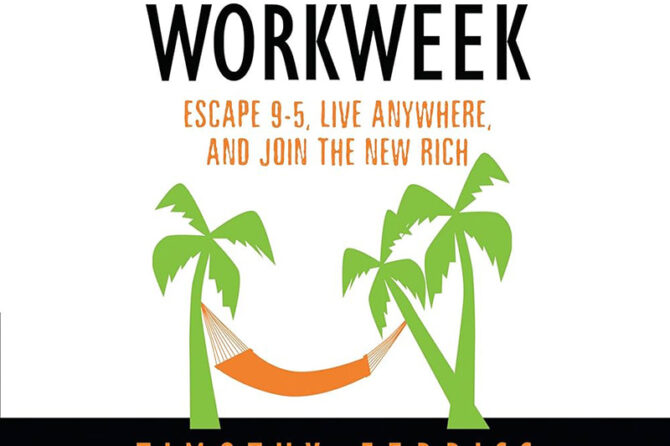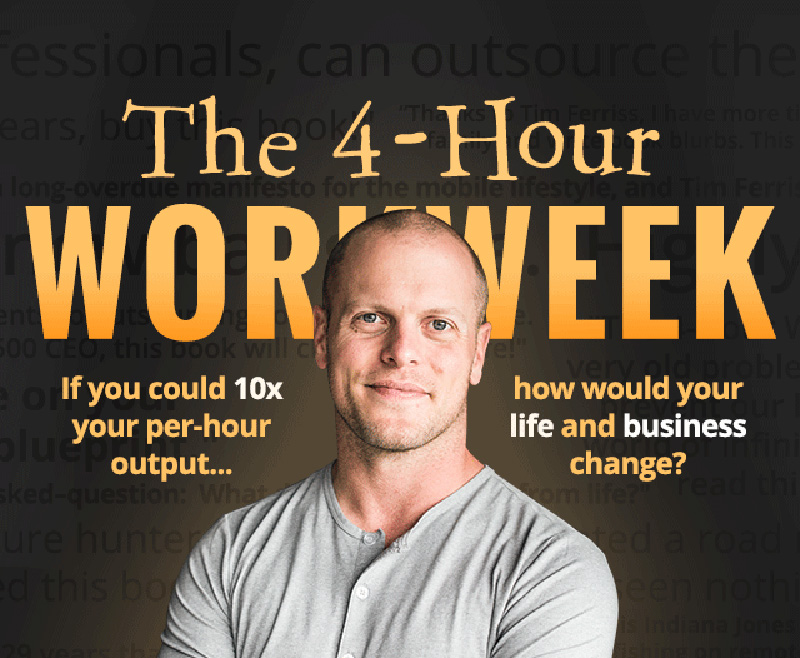
A quote by Timothy Ferriss in terms of wealth and income, “Earn dollars. Live on pesos. Compensate in rupees,” hit me hard. This highlights the potential of geo-arbitrage – living in a low-cost country, outsourcing work to another low cost country, while earning in a stronger currency. While this may be practical for people living in developed countries, definitely not for me, a person living in a developing country and earning in rupees.
However, when I first encountered “The 4-Hour Workweek” by Timothy Ferriss, my curiosity was piqued by its bold promise: Escape the 9-5, live anywhere, and join the new rich. This New York Times bestseller challenges conventional notions of work and life, aiming to reconstruct our understanding of success. While initially sceptical of its seemingly ‘markety’ tone and grand claims, I found the book imbued with insights that resonated with me.
Ferriss begins by dismantling the traditional concept of retirement and career trajectory. He argues, “Most of us have the idea that we are supposed to work until we are 60, then retire and live the good life.” He counters this with the concept of the “New Rich” (NR), individuals who optimize their lifestyle to enjoy life’s riches now, rather than postponing them. This concept struck a chord with me, especially in today’s fast-paced, unpredictable world.
One of Ferriss’s central tenets is the idea of ‘mini-retirements.’ He suggests, instead of a single, end-of-life retirement, we should integrate significant breaks throughout our careers. This idea, though radical, appeals to my sense of adventure and acknowledges the uncertainties of saving all leisure for a future that is not guaranteed.
Ferriss’s approach to business and entrepreneurship is another highlight. He advises being a business owner rather than a business runner, emphasizing the creation of systems that allow you to step away without collapsing the venture. This resonates with my experiences, affirming that “Time is your most valuable asset.” In a world where burnout is rampant, this advice feels particularly pertinent.

His practical tips on time management are not ground-breaking but serve as valuable reminders. Strategies like checking emails only a few times a day and batching similar tasks are simple yet effective. He advocates for outsourcing mundane tasks to free up time for more significant pursuits, stating, “I not only use all the brains that I have but all that I can borrow.” This quote, borrowed from Woodrow Wilson, encapsulates Ferriss’s approach to efficient problem-solving.
However, the book is not without its controversial aspects. Ferriss recounts winning a kickboxing championship by exploiting loopholes in the rules, a story that might leave readers questioning the ethics behind such tactics. This anecdote, while illustrating his point about efficiency and unconventional thinking, might not sit well with everyone.
One of the more profound insights in the book is the application of the 80/20 rule, that is dear to me. Ferriss explains that 80% of outputs come from 20% of inputs. Applying this to various life aspects, from business to personal relationships, can lead to significant efficiency improvements and life satisfaction.
Ferriss also encourages reaching out to influential people for advice and mentorship, challenging the reader to step out of their comfort zone. He rightly points out, “What we fear doing most is usually what we most need to do.” This line was a push for me to expand my network and seek guidance from those I admire.
A delightful part of the book is Ferriss’s incorporation of humour and light-hearted anecdotes, like the story of outsourcing personal tasks to India. It adds a relatable and enjoyable touch to the narrative, making complex ideas more digestible.
Nevertheless, the book’s tone can come across as self-congratulatory or even narcissistic at times. The relentless focus on personal gain and efficiency may overshadow deeper values like community, empathy, and ethical considerations in business and personal interactions.
In conclusion, “The 4-Hour Workweek” is a mixed bag of revolutionary ideas, practical advice, and controversial opinions. Ferriss challenges readers to rethink their work-life balance, offers tips on efficiency and entrepreneurship, and proposes a lifestyle of freedom and adventure. While not all aspects may be practical or appealing to every reader, the book undeniably provides food for thought and has the potential to inspire significant changes in how one approaches work and life. As Ferriss himself says, “Different is better when it is more effective or more fun.” This book embodies that spirit, offering a different perspective that could be more effective and certainly more fun than traditional paths.
One quote from the book that will be permanently etched on my mind is “There is no ‘I’ in ‘TEAMWORK’.”
Prof. Dr. Prahlada N. B
4 December 2023
Chitradurga.

















Prahlada Sir 💐
Any continuous work should have breaks, to recuperate & rejuvenate oneself.
Timothy Ferris’ proposal of 4-hour work week…will not be liked by many.
In contrast, our own Infosys Narayana Murthy Sir’s call for Indian youths, to work for 70-hours a week, as is seen in Japan & Germany, also didn’t go well with all. In fact this discussion about 70 hours’ work , every week in Parliament also , didn’t yield any response from Government.
Timothy’s proposal of 4-hour work week may appeal to rich or those who think that they have achieved everything in life or those who have crossed 60 years of age, when they might think to enjoy their life, stay cool & live life to the fullest …..in the evening years of their life.
Reply